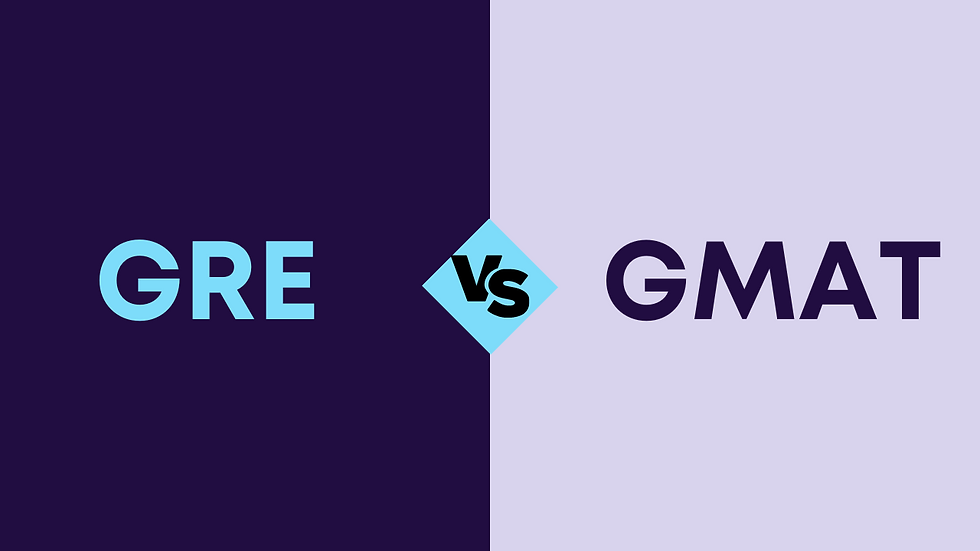
When applying to graduate business programmes, you may find that many schools need test scores as part of the admissions process. You may be able to submit either your Graduate Management Admission Test (GMAT) or your Graduate Record Examination (GRE) result.
The most notable difference between the GMAT and the GRE is that the GMAT is primarily used for business school admissions, but the GRE is accepted for most graduate programs (including business and law schools). Aside from that, the two tests have distinct formats, question kinds, testing regulations, and choices for forwarding your results to colleges.
In this article, we'll look at each exam in detail and discuss why you might choose one over the other—or neither—to boost your graduate program application.
GMAT vs. GRE: Key differences
More than 1,200 MBA programs now accept GMAT or GRE scores for business school applications, giving you more options. Before deciding which test to take, look into the business schools that interest you and see if they accept GRE scores instead of GMAT ratings. Compare the content and structure of the GMAT with the GRE exams below:
BASIS | GMAT Focus Edition | GRE |
Why Take It? | The exam is necessary for entrance to the majority of business schools. | If you haven't made up your mind on the type of graduate program you want to enroll in, you can opt for GRE. |
Test Fee | $275 | $205 |
Test Dates | Year-Round | Year-Round |
Test Validity | 5 Years | 5 Years |
Test Format | Computer-Adaptive Test | Computer-Adaptive Test |
Sections | 3 Sections | 5 Sections |
Test Duration | 2 Hours 15 Minutes | 1 Hour 58 Minutes |
How is the test administered? | Computer-based Test | Computer-based & Paper-based Test where computer-based tests are unavailable. |
AWA Section | - | 1 Essay, 30 Minutes |
Data Insights Section | 20 Questions; 45 Minutes | NA |
Quantitative Reasoning | 21 Questions; 45 Minutes | 2 Sections: 12 Questions in 21 Minutes; 15 Questions in 26 Minutes |
Verbal Reasoning | 23 Questions; 45 Minutes | 2 Sections: 12 Questions in 18 Minutes; 15 Questions in 23 Minutes |
Test Score Range | 205-805 (In 10-point increment) | 260-340 (In 1-point increment) |
Quant Score Range | 60-90 (Scaled Score) | 130-170 |
Verbal Score Range | 60-90 (Scaled Score) | 130-170 |
Data Insights Score Range | 60-90 (Scaled Score) | - |
AWA Score | - | 0-6 |
GMAT vs GRE Scores for MBA Program
Admissions trends indicate that business schools are seeking for applicants with more than simply a business experience, implying that the GMAT is no longer the only test in the game. Because the GMAT and GRE are fundamentally distinct tests, comparing their results is like comparing apples to oranges. Both ETS (the entity which administer the GRE) and GMAC (the entity which administer the GMAT) employ comparison tools to help students understand their scores, although many MBA programs use the ETS comparison tool as a benchmark.
To make the most of your score and application, investigate your preferred institutions to determine what score ranges they demand for acceptance.
How do you choose between GRE and GMAT?
The easiest method to evaluate if the GMAT or GRE is more appropriate for your abilities is to take a practice test for each exam. Getting into business school is competitive, and you don't want to take a GRE or GMAT without first taking a practice test. For both the GRE and the GMAT, we provide demo tests.
Whatever exam you choose, you'll need to prepare if you want to earn a score that admissions authorities won't overlook. You may examine your strengths and weaknesses with a free GMAT and an official GRE diagnostic test. You have your answer if you perform better on one test than another. If you decide to take the GMAT, consider the 5-year trend of GMAT scores at primary business schools to determine your desired GMAT score.
Do business schools prefer the GMAT or the GRE?
Although many business schools state that they don't care about GMAT or GRE scores, more than 90% of applicants include the GMAT score. Why is this the case?
There are three reasons for this:
● GMAT is designed to examine skills that enable MBA admission committees determine who can not only get into but also complete the MBA program.
● Taking the GMAT shows Business Schools how clear your career ambitions are. Because the GRE is recognized for other graduate programs, admission committees may question your commitment to a business graduate school.
● Most business schools compare applicants' GMAT scores since they are more comfortable reading them. You never know whether business schools convert GRE scores to GMAT scaled scores to compare all applicants.
Which test is easier? GMAT or GRE?
The GMAT is best suited to those with strong quantitative and analytical skills and those who excel at understanding data presented in charts, tables, and text to solve complicated issues. Unlike the GMAT, the GRE math component is more basic and provides a calculator for all quantitative problems. Strong editors may like the GMAT verbal part, whereas if you have a strong vocabulary, one may prefer the GRE.
Both tests feature "oddball" question types—Quantitative Comparison on the GRE and Data Sufficiency on the GMAT—that will require some practice to become used to.
The primary distinction between the GMAT and the GRE is that the GMAT is only used for business school admissions, whereas the GRE is used for a wide range of graduate programs. It is suggested that you take the GMAT if you wish to apply for Business programs. For specialized masters degree programs, GRE is more suitable.
Comments